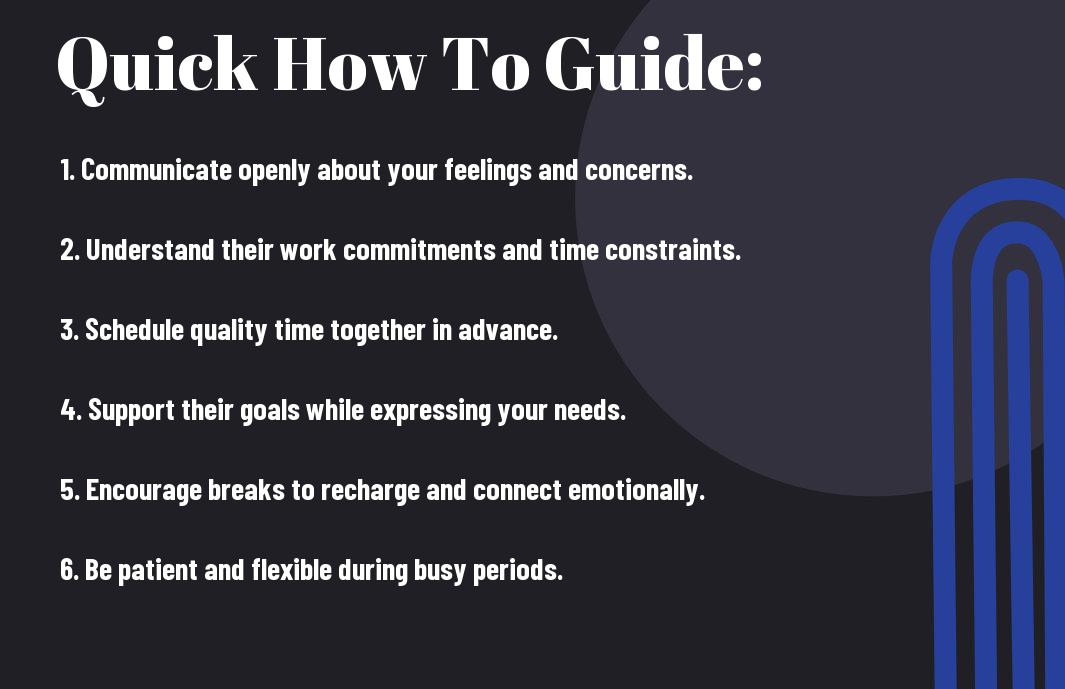Dating someone who is a workaholic can be both rewarding and challenging. You might find yourself captivated by their ambition and drive, but their intense focus on work can lead to feelings of neglect or frustration. It’s vital to navigate this relationship dynamic with understanding and communication. In this guide, you’ll discover how to foster a healthy connection while respecting your partner’s work commitments, ensuring that both your emotional needs and their professional aspirations are met.
Understanding Workaholism
For many, the pursuit of success can morph into an overwhelming obsession known as workaholism. This compulsive behavior often leads individuals to prioritize work over personal relationships and self-care, creating a gap that can affect their loved ones. By understanding this phenomenon, you can better navigate the challenges that arise while dating someone deeply invested in their career.
Defining Workaholism
There’s a fine line between a strong work ethic and workaholism. Workaholism is characterized by an uncontrollable urge to work excessively, often at the expense of personal relationships and wellbeing. This compulsive dedication may stem from a desire for achievement, validation, or simply the need to keep busy.
Identifying the Signs
Clearly, identifying a workaholic can be challenging, as not every hardworking person fits this mold. However, certain signs can help you discern whether your partner may be a workaholic. These can include consistently prioritizing work over personal time, feeling guilty when not working, or having difficulty disconnecting from work-related tasks and communications.
This recognition is paramount, as it allows you to address the issue before it escalates further. Typical signs include frequent late-night emails, anxiety when away from the job, and a chronic lack of work-life balance. If you notice these patterns, it may be time to have a candid conversation about the impact of their work habits on your relationship and discuss potential solutions together.

Assessing Your Relationship
Even in the midst of a busy work life, it’s vital to take the time to evaluate the dynamics of your relationship. Consider how your partner’s work habits affect your connection and whether you still feel supported and valued. Open communication about your feelings can help both of you identify areas that need improvement and determine if the relationship can adapt to meet both your needs.
Evaluating Your Needs
Your emotional and physical needs are important, especially in a relationship with a workaholic. Reflect on what you require for happiness and fulfillment. It may involve quality time together, emotional support, or even basic companionship. Clearly communicating these needs to your partner can pave the way for a more balanced relationship that works for both of you.
Understanding Their Priorities
On the other hand, it’s necessary to understand that your partner’s work commitments often reflect their priorities and aspirations. This context can give you insight into why they struggle to balance work and personal life. Acknowledging their drive can foster empathy, enabling you to approach discussions without resentment and helping both of you find a more harmonious way to manage your time together.
A key part of understanding your partner’s priorities is recognizing the value they place on their career. This often stems from personal goals, financial responsibilities, or simply the satisfaction they derive from their work. Acknowledging this does not mean you have to accept neglectful behavior, but it allows you to address any concerns constructively. By fostering open dialogue about their ambitions and the resulting impact on your relationship, you can collaborate to create a healthier balance that respects both of your needs.
Communication Strategies
All successful relationships hinge on effective communication. When dating a workaholic, it’s important to establish open lines of dialogue. Approach conversations with empathy and understanding, making it clear that you value their dedication to their career but also need to address your emotional needs. Regular check-ins can foster a deeper connection, allowing you both to express your thoughts and feelings without feeling rushed or dismissed.
Expressing Your Feelings
Your emotions matter and should be communicated honestly. Share how their work habits affect you, ensuring that you frame your feelings in a non-confrontational way. Use “I” statements to express your concerns, such as “I feel lonely when we don’t spend much time together.” This helps your partner understand your perspective while minimizing defensiveness.
Setting Boundaries
Setting limits is important for maintaining a healthy relationship with a workaholic. It helps create a respectful balance between their professional commitments and your personal time together.
It’s important to establish clear boundaries regarding work and relationship time. Specify certain days or hours for quality time together, and encourage your partner to unplug during those periods. By being upfront about your needs, you create an environment in which both of you can thrive. Make sure these boundaries are mutually agreed upon and revisit them as necessary, allowing for adjustments as your partner’s workload changes.
Finding Balance
Your relationship with a workaholic can thrive if you find the right balance between their work commitments and your time together. Establishing clear boundaries regarding work hours and personal time can help create a harmonious environment. Encourage open communication about each other’s needs, ensuring both your expectations are met. Don’t hesitate to set aside dedicated times for fun activities, allowing spontaneity to flourish alongside your partner’s structured professional life.
Prioritizing Quality Time
If you want to maintain a strong connection with your workaholic partner, prioritize quality time together. Schedule regular date nights or weekend getaways to create lasting memories while still accounting for their work schedule. Focus on being present during these moments, setting aside distractions to genuinely connect and support one another. Incorporating small routines, like morning coffee together or evening walks, can also enhance your bond.
Supporting Their Career
Now more than ever, being supportive of your partner’s career is vital to sustaining a balanced relationship. Acknowledging their hard work can strengthen your bond and provide them the motivation to create space for personal time. Show interest in their projects, offer encouragement, and celebrate their achievements to reinforce your partnership. It’s important to remind them that while work is important, nurturing your relationship is equally valuable for both of you.
Quality support goes beyond mere encouragement; it includes understanding their work demands and being patient during stressful times. Engage in conversations about their work without always entering into nitty-gritty details. Establish a system where both of you feel valued at home and in the workplace. This foundation fosters a supportive partnership, ensuring that as they excel in their career, they also maintain a fulfilling relationship with you.
Coping Mechanisms
Not understanding how to cope with your partner’s workaholic tendencies can lead to feelings of loneliness and resentment. It’s vital to find healthy strategies to navigate this relationship dynamic. Consider exploring Dating A Workaholic: Tips For Navigating Relationships … to gain insights on managing your experiences effectively.
Self-Care Practices
Coping with a workaholic partner requires prioritizing self-care. Make time for activities that nourish your mind and body, such as exercise, meditation, or spending time with friends and family. You should focus on your needs to maintain your emotional well-being and create a more balanced relationship.
Engaging in Hobbies
With your partner often preoccupied with work, it’s an excellent opportunity for you to investigate hobbies that interest you. Engaging in activities you love can provide a fulfilling outlet and raise your spirits, ensuring you don’t feel neglected. Whether it’s painting, gardening, or playing an instrument, use this time to enrich your life and explore new passions.
Another way to enhance your well-being is to join local clubs or classes related to your hobbies, allowing you to meet like-minded individuals. This exploration not only fills your time meaningfully but also boosts your confidence and happiness, creating a positive focus while your partner is absorbed in work. By developing your interests, you can create a more fulfilling personal life that complements your relationship.

Seeking Professional Help
Once again, navigating a relationship with a workaholic can be challenging, and sometimes you may need external support. Seeking professional help can provide you both with strategies to improve your relationship dynamics. A skilled therapist can help facilitate meaningful conversations and emotional connections, ultimately fostering greater understanding and balance. Don’t hesitate to explore this avenue if you feel overwhelmed or uncertain about how to proceed.
When to Consider Therapy
Consider seeking therapy if you find that communication has broken down, arguments are becoming more frequent, or you feel increasingly neglected in the relationship. Therapy can be a constructive space to discuss your feelings and understand the underlying issues contributing to the workaholic behavior. Recognizing these signs early can help prevent further emotional distress.
Finding the Right Counselor
Help is available when looking for a counselor who specializes in work-life balance or relationship issues. Prioritize finding someone who understands the unique challenges associated with dating a workaholic, as their experience will be invaluable in navigating your situation effectively.
Professional help can take various forms, whether it’s individual or couples therapy. You might want to consider licensed therapists who have experience working with clients facing similar issues. Look for someone who provides a comfortable and safe environment for both of you to express yourselves. It’s a good idea to arrange a preliminary meeting to gauge their compatibility with your relationship needs, ensuring you both feel heard and supported.
Conclusion
Taking this into account, navigating a relationship with a workaholic requires open communication and understanding of their personal commitments. Acknowledge their dedication while also expressing your needs for quality time together. Encourage them to prioritize balance in their life, and consider setting shared goals for relationship time. By fostering a supportive environment and establishing boundaries, you can enhance your relationship’s emotional connection while respecting each other’s aspirations.










